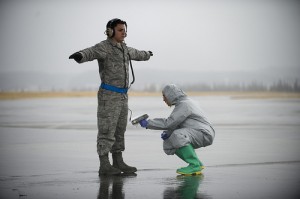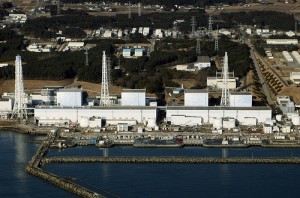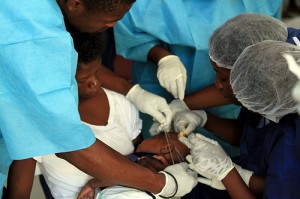Posted on 30 March 2011. Tags: acute radiation syndrome, armed forces radiobiology research, armed forces radiobiology research institute, critical gap, hartl, medical field, nuclear power plants, nuclear problems, radiation exposure, world health organization
 The nuclear problems in Japan emphasize one critical gap in the medical field- experts only have had a few proven ways to help treat people who have already been exposed to massive amounts of radiation.
The nuclear problems in Japan emphasize one critical gap in the medical field- experts only have had a few proven ways to help treat people who have already been exposed to massive amounts of radiation.
Last week, two workers from Japan’s nuclear power plants were hospitalized due to radiation burns. Low levels of radioactive iodine were reported, Tuesday, at some areas in southeastern China. Some traces were also discovered in Seoul to as far as Britain and eastern United States.
The crisis in Japan raises concern among people as to how radiation emergencies can be effectively treated. Some experts are already developing drugs that will treat radiation poisoning, as well as the first tests that will determine who among the exposed people would need rapid treatment.
However, these possibilities are still in preparation, and not yet ready.
In the United States, radiobiology laboratories such as the Armed Forces Radiobiology Research Institute are now in search for more methods to treat people against radiation exposure. The laboratory is working with Oncova Company to develop one possible treatment called Ex-Rad.
Since 2008, the Biomedical Advanced Research and Development Authority have invested millions for radiation testing and anti-radiation treatment.
Currently, only a few are proven effective for radiation injuries. These include antibiotic therapy, providing blood-clotting platelets and hydration therapy for acute radiation syndrome, as well as overall poisoning.
Potassium iodide is usually given to prevent long-term effects. However, World Health Organization advises the public not to drink the pills unless health officials recommend them to. Gregory Hartl, WHO spokesman, says the drug has its risks.
Posted in Health
Posted on 15 March 2011. Tags: cooling systems, crick, health threats, japan meteorological agency, low health, magnitude quake, nuclear power reactors, precautionary measure, public health risk, world health organization
 Experts say health threats from the power reactors hit by the 8.9 magnitude quake in Japan appear relatively low. Also, winds will likely bring any contaminations to the Pacific Ocean without harming other countries.
Experts say health threats from the power reactors hit by the 8.9 magnitude quake in Japan appear relatively low. Also, winds will likely bring any contaminations to the Pacific Ocean without harming other countries.
Japan struggled to prevent a meltdown at the three affected reactors located at the Fukushima plant. It was the worst accident in nuclear power plants, triggered by the 10-foot high tsunami, since the Chernobyl disaster in 1986.
Also, high levels of radiation were recorded at the Onagawa nuclear power plant.
However, U.N. Scientific Committee on the Effects of Atomic Radiation Secretary’s Malcolm Crick said the explosion at the nuclear power reactors is not a grave issue in public health at the present.
Crick said the accident won’t lead something similar to Chernobyl.
During the Chernobyl disaster, it exploded when the reactor was working at full power. Still, about 140,000 people living around the area in Fukushima have been asked to evacuate as a precautionary measure.
Crick said the partial meltdown of United States’ Three Mile Island plant in 1979 was rated more serious on an international extent than the accident in Japan.
The public health risk from the atomic plants in Japan remained “fairly low”, according to the World Health Organization. But, the quake and catastrophic tsunami might have killed about 10,000 people.
Japan Meteorological Agency informed that the winds in the region would move from the south to the west on Sunday night. Thus, it will blow from Fukushima toward the great Pacific Ocean.
The strongest earthquake ever recorded in Japan on Friday blew down the back-up cooling systems at Fukushima. This caused a build-up of pressure and heat, which then led to an explosion on the plant on Saturday.
Posted in Health
Posted on 21 October 2010. Tags: contaminated water, health authorities, health department director, health officials, medical teams, oral rehydration salts, port au prince, waterborne diseases, watery diarrhea, world health organization
 An outbreak of suspected cholera had killed nearly 140 people in central Haiti according to the Haitian health officials on Thursday. Since the January 12 earthquake, this is the country’s biggest medical crisis.
An outbreak of suspected cholera had killed nearly 140 people in central Haiti according to the Haitian health officials on Thursday. Since the January 12 earthquake, this is the country’s biggest medical crisis.
The Haitian health authorities had already informed the World Health Organization regarding their 138 deaths and about 1,526 cases so far in the outbreak that is centered on Lower Artibonite region, north of the Port-au-Prince capital. Some cases were also listed in the area of Central Plateau.
Local hospitals in Haiti were overwhelmed with the tremendous number of patients admitted, most of which are suffering from acute diarrhea. The Haitian officials informed that the victims are rapidly dying from dehydration in just a matter of hours.
Medical teams that have been giving assistance to Haiti since the disaster that occurred on January 12 have set out to the outbreak area.
However, the World Health Organization, as well as the United Nations could not confirm yet if the cause of the outbreak is cholera. They are still waiting for the final results of the laboratory tests that were taken from the samples of the dead and sick victim.
But, Dr. Gabriel Thimote, the Haitian Health Department Director General and Alex Larsen, the Health Minister said that the initial testing suggested cholera even though Haiti does not have any history of recent cholera outbreaks.
Cholera is a disease transmitted through contaminated water and food. This causes watery diarrhea and severe dehydration, which can kill in few hours when not immediately treated.
Yet, experts say that there are about 80 percent of cholera cases that can be successfully treated through oral rehydration salts. However, safe water and good sanitation are still important to help reduce the cases of cholera and other waterborne diseases.
Posted in Health
 The nuclear problems in Japan emphasize one critical gap in the medical field- experts only have had a few proven ways to help treat people who have already been exposed to massive amounts of radiation.
The nuclear problems in Japan emphasize one critical gap in the medical field- experts only have had a few proven ways to help treat people who have already been exposed to massive amounts of radiation.
 Experts say health threats from the power reactors hit by the 8.9 magnitude quake in Japan appear relatively low. Also, winds will likely bring any contaminations to the Pacific Ocean without harming other countries.
Experts say health threats from the power reactors hit by the 8.9 magnitude quake in Japan appear relatively low. Also, winds will likely bring any contaminations to the Pacific Ocean without harming other countries. An outbreak of suspected cholera had killed nearly 140 people in central Haiti according to the Haitian health officials on Thursday. Since the January 12 earthquake, this is the country’s biggest medical crisis.
An outbreak of suspected cholera had killed nearly 140 people in central Haiti according to the Haitian health officials on Thursday. Since the January 12 earthquake, this is the country’s biggest medical crisis.